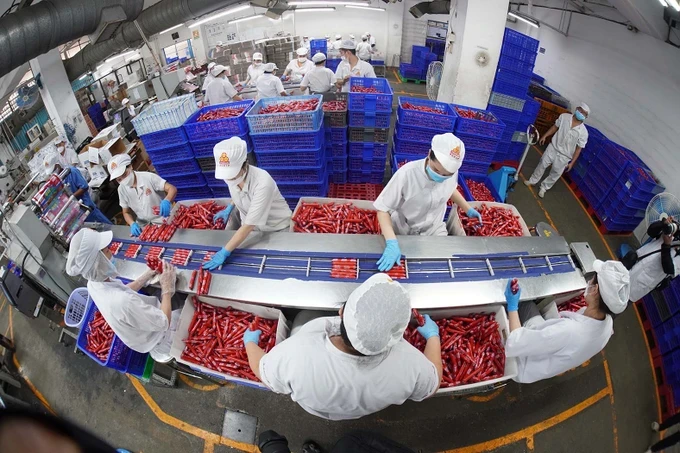Bureaucratic red tape stifles Vietnam's economic growth
Society – Economy - Ngày đăng : 18:00, 06/11/2024

The case of Vissan JSC is a prime example. Its Deputy General Director Le Minh Tuan revealed that the company's investment project in Long An Province has been delayed for eight years due to land-related bureaucratic hurdles. As a result, the company has lost opportunities to develop its chilled meat product line.
More alarmingly, the company faces the risk of being unable to expand as its production plant in HCMC has reached maximum capacity and is scheduled for relocation in 2029. “It's a lose-lose situation. If this issue is not resolved promptly, it will severely impact Vissan's business performance,” expressed Tuan with concern.
Director Pham Tuan Kien of Tan Chau Garment Export Co. Ltd. disclosed a similar story, saying that their state land lease contract at their current production site in Ward 13 of Tan Binh District in HCMC expires at the end of 2025. However, the authorities have yet to provide clear guidance regarding lease renewal. This uncertainty significantly hampers the company's development investment plans.
“For a business, strategic planning can't be limited to annual cycles. It requires a long-term vision spanning 10, 20 years, or even longer. Such a dilemma regarding our location puts us in an untenable position, forcing us to implement temporary production and market development plans. How can enterprises achieve robust and sustainable growth under such circumstances?” Kien lamented.
The squandering of market opportunities extends across various sectors and industries. Take, for instance, waste management in HCMC. Chairman Huynh Minh Nhut of the Vietnam Environment and Industrial Park Association reported that the city processes approximately 9,000-11,000 tonnes of domestic waste daily. The current landfill-based waste disposal method consumes an enormous land area of nearly 1,000 hectares (336 hectares for Phuoc Hiep Solid Waste Treatment Complex in Cu Chi District and 600 hectares for Da Phuoc Waste Treatment Zone in Binh Chanh District).
HCMC has been promoting investment in modern waste treatment technologies, such as waste-to-energy. These technologies offer numerous benefits, including land conservation, the utilization of waste as raw materials for other industries, and the production of clean energy. However, complex administrative procedures and pending approvals have discouraged many investors, resulting in the waste of social resources.
Market opportunity wastage affects both state-owned and private enterprises, significantly impacting operational efficiency. Mr. Lam Quoc Thanh, General Director of Saigon Trading Corporation (Satra), noted that state-owned enterprises with high capital ratios face stringent oversight, limiting their decision-making autonomy, especially in dynamic markets, where rapid responses are needed during significant fluctuations. Additionally, complex administrative procedures, particularly in investment and land use, significantly delay projects, hindering business growth and development.
“The implementation of impractical regulations by functional departments also generates resource waste, to a certain extent undermining Vietnamese enterprises' competitiveness and development opportunities both domestically and in export markets,” added Chairwoman Ly Kim Chi of the HCMC Food and Foodstuff Association.
Another wasteful project is the numerous wind power projects in Soc Trang Province that have been completed but cannot be commercially operated, resulting in significant waste. While 19 wind power projects with a total capacity of approximately 1,395 MW have been approved, only seven of the 11 projects under construction have become operational. The remaining four completed projects, including Cong Ly Wind Power Plant and Wind Power Plant No. 3, are awaiting a feed-in tariff from the Ministry of Industry and Trade.
This delay has led to a substantial waste of resources as these projects require significant investment and the idle equipment is subject to depreciation and damage.
Similar delays in the renewable energy sector, such as wind and solar power projects in other provinces like Bac Lieu, Ben Tre, and Tra Vinh, are also due to the lack of a clear pricing mechanism. If this bottleneck is not addressed promptly, it will result in a massive waste of social resources and erode investor confidence.
Chairman Nguyen Ngoc Hoa of the HCMC Businesses Association commented that to mitigate waste, it is essential to effectively implement Decree 73/2023 by the Government, which encourages and protects dynamic, creative officials who dare to think, act, and take responsibility for the common good.
Furthermore, to reduce the time and resources spent on developing numerous plans and restructuring strategies for various sectors, responsibilities should be assigned directly to relevant agencies based on their functions and areas of expertise. Streamlining the process of developing, consulting, and issuing policies will enable businesses to easily access and leverage the opportunities provided by these policies. This is a crucial factor in driving the country's development.
Dr Huynh Thanh Dien from Nguyen Tat Thanh University stressed that despite significant potential, advantages, and well-designed development policies in Vietnam, implementation falls short of expectations. Bureaucratic inefficiency is a key factor in missed opportunities. While government leaders demonstrate strong commitment, implementation faces obstacles due to cumbersome, overlapping policies and ineffective coordination mechanisms.
He pointed out several reasons, including the complex and overlapping regulations, ineffective coordination mechanisms, and the lack of support for creative and innovative ideas. This is like having ample capital but lacking the ability to start a successful business.
To catalyze development, Vietnam needs synchronized infrastructure investment (both hard and soft), effective policy mechanisms, and an environment that fosters innovation. This will empower civil servants to boldly innovate and decisively execute tasks, driving increased productivity and labor quality across the economy.
